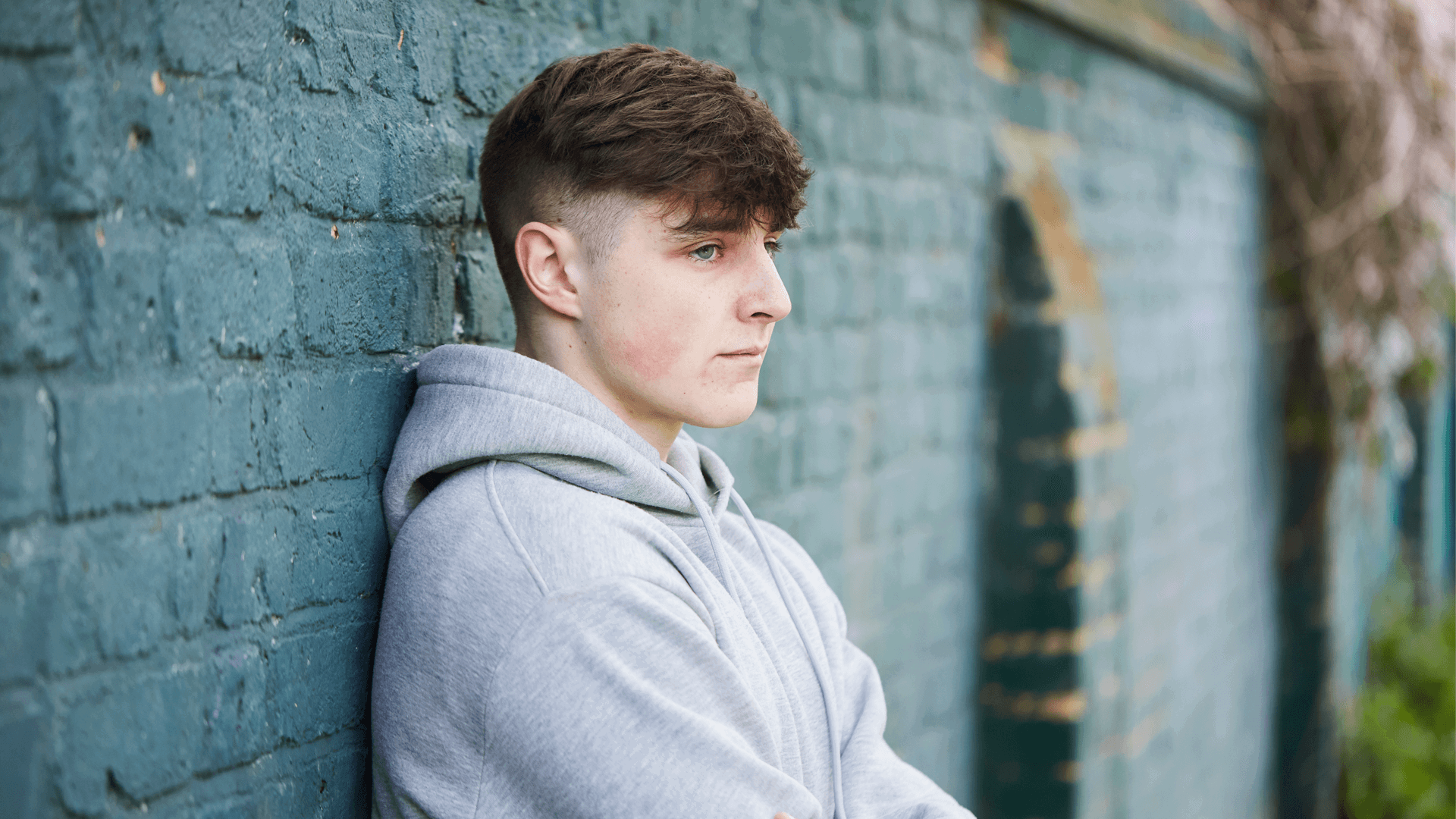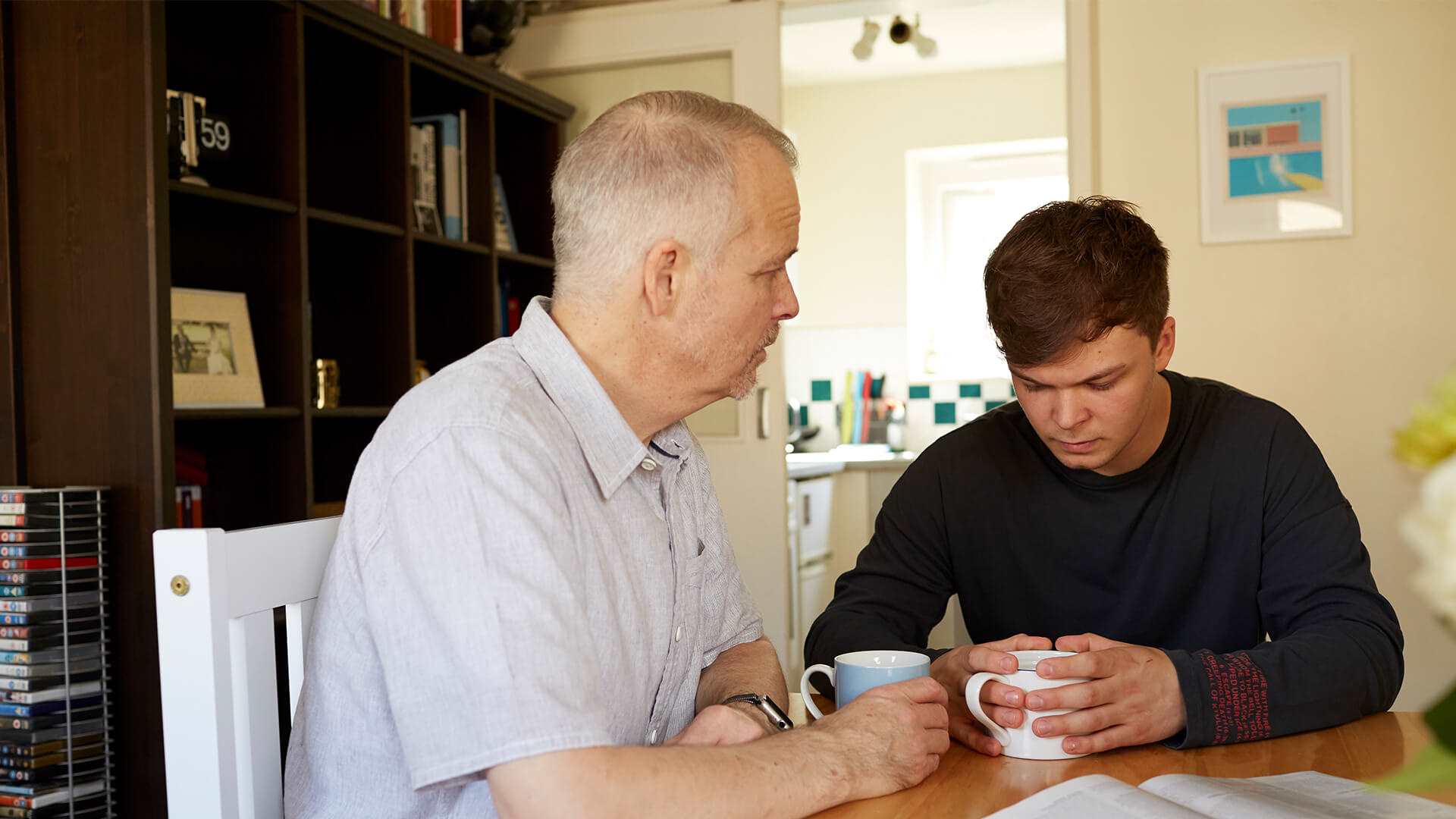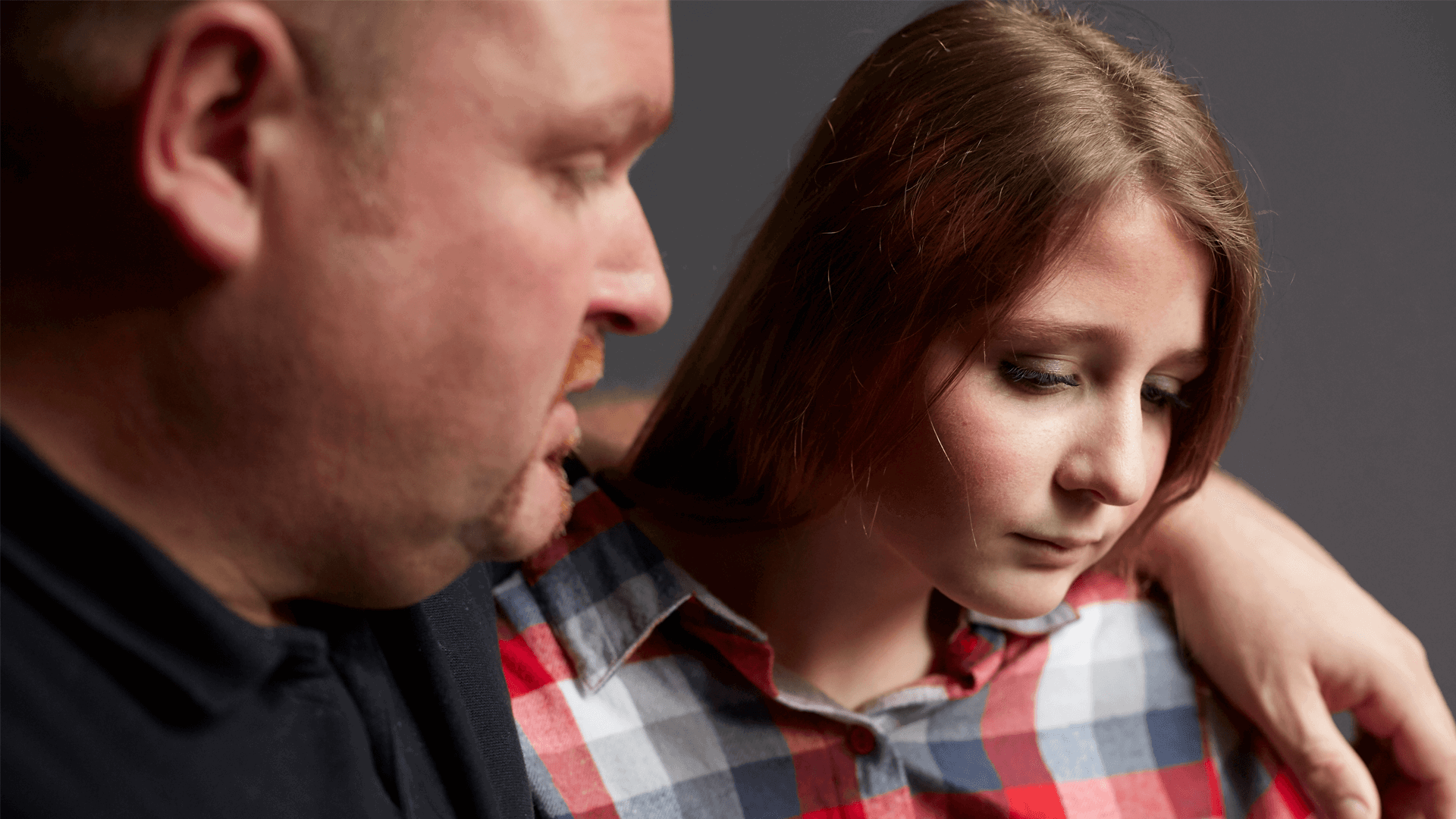Lots of young people will have thoughts about suicide at some point. This doesn’t mean they are necessarily going to attempt suicide, but it does mean they need help and support. All suicidal feelings should be taken seriously – and as a parent, you are right to be concerned.
Knowing or worrying that your child is experiencing suicidal thoughts can be an incredibly distressing experience. The important thing to remember is that it is possible for your child to come out the other side and feel okay again, and that you are not alone – on this page, you can find organisations and professionals who can help you.
The important thing to remember is that it is possible for your child to come out the other side and feel okay again.
How do I know if my child is having suicidal thoughts?
It’s not always easy to know if a young person is having suicidal thoughts – as every young person is different and will express, or not express, their feelings differently. Some young people will be very clear that they are thinking about suicide, while others won’t – and suicidal thoughts can arise as sudden urges or be considered over a longer period of time. This can make it difficult to know what you need to do to keep your child safe, and this is often the biggest challenge for parents.
You can try to find out what’s going on by creating opportunities for your child to talk to you, and we’ve got some tips below to help you do this. Changes in your child’s behaviour can also indicate what’s going on for them emotionally. While these won’t apply to everyone, your child may be experiencing suicidal thoughts if they:
- express feelings of hopelessness, worthlessness, sadness and/or guilt and shame
- withdraw – spending lots of time alone, not wanting to be around people or stopping seeing friends
- lose interest in daily life or things they usually enjoy
- say things like ‘I wish I wasn’t here’, ‘I can’t go on’, ‘I can’t take it anymore’ or ‘people would be better off without me’, or talk a lot about death
- give away their possessions
- seem agitated and/or behave in ways that seem strange or out of character
- show changes such as eating or sleeping more or less than usual, or a lack of interest in their appearance
- use drugs and alcohol to help them cope when they’re struggling, which can intensify thoughts, feelings and impulsive decision-making
- are self-harming, or have self-harmed in the past
If you are worried that your child is experiencing suicidal thoughts, it’s a good idea to talk your concerns through with a professional – so that you can think about what to do next. You can find out how to find professional help below.

Self-harm and suicide
It’s useful to understand that while there are links between self-harm and suicide, the fact that a young person is self-harming does not necessarily mean they will go on to attempt suicide.
Research shows that young people who take their own lives are more likely to have previously self-harmed. But self-harm can be a coping mechanism, rather than an expression of suicidal feelings – and some young people will self-harm without experiencing suicidal thoughts.
For more information and advice about self-harm, have a look at our guide.
How can I talk to my child about suicidal thoughts?
Talking to your child about this can feel scary or nerve-wracking, and you may be worried about saying the wrong thing or making the situation worse. In fact, finding out how your child is feeling and giving them a chance to talk can help. A young person who is thinking about suicide often feels very alone with their dark thoughts, and being able to share their worries may reduce their feeling of isolation. It will also help you understand what’s going on, allowing you to make a more informed decision about what to do next.
If you’re concerned, ask your child directly whether they are thinking about suicide, using the word ‘suicide’ yourself. This lets them know that it’s okay to talk about it, that you want them to tell you, and that you are someone they can talk to.
This can feel like a very difficult and daunting thing to do. If you’re unsure how to go about the conversation, you can have a look at the conversation starters suggested by Prevention of Young Suicide (PAPYRUS), and the tips in their guide for parent and carers. You can also contact their Hopeline for support, information and advice over the phone – including around preparing for the conversation or thinking through what to do afterwards.
If your child tells you they are having suicidal thoughts:
- Take their feelings seriously. They may have taken a big risk in telling you, and it’s important that they feel heard.
- Let them know you’re really glad they’ve told you. This will help to reassure any worries they have about how you will react, or what you might be thinking.
- Listen and empathise with just how bad things are. If you can, use their own words to reflect how they might be feeling. Try not to fix or downplay feelings, focusing at first on providing emotional support and letting them talk for as long as they need to.
- Think together about what’s making them feel this way. Try to get a sense of what they feel has brought them to a place where things are so bad, and whether there are changes that could be made in their lives to help things feel better.
- Try to get a sense of what their thoughts are like. It’s important to establish whether they have an intent or plan to attempt suicide – for example they might have thought about how, when or where they will do it, or researched methods online. This is the biggest sign that they are at risk of making an attempt, and that you need to seek urgent professional help.
- Reassure them that you love them, they’re not alone, you can find support together and they can talk to you about these thoughts whenever they need to.
- After the conversation, seek professional advice about what to do next. You can find out how to find help and support below.
Remember that while it is incredibly worrying to hear your child talk about suicide, it can be a positive step when they are able to recognise and communicate how they’re feeling – as this makes it more possible for them to get help.

What can I do if my child doesn't want to talk to me?
Some young people will find it difficult to talk. As a parent, this can be incredibly challenging. When you’re desperate to help your child but they don’t want to talk, it can leave you feeling powerless and frustrated. It can also increase the strain on you, making you feel that you need to constantly monitor their level of risk.
If your child is finding it difficult to talk, it could be helpful to find other ways of opening up the conversation. Writing or texting, or talking while walking or doing an activity, could help them to feel more relaxed. You can find our activity ideas for starting a conversation here.

Some young people may find it easier to speak to someone else, such as another member of the family or a family friend, or to talk online or by text to a helpline service. If this is the case, encourage them to do this when they need to, while reassuring them that you’ll still be there.
If you’re not sure what’s going on, you may find it helpful to reach out to someone at your child’s school for support, as they may have noticed changes in their behaviour, or may also have concerns.
Ultimately, if your child doesn’t want to talk, there’s no way to make them. If you’re worried, seek professional help. If your child isn’t talking and you’re worried about their safety, you should follow the steps below to get urgent professional help.
Where can I find help?
- If there is a suicide attempt beginning, or your child has already made an attempt or been injured, call 999 for an ambulance straightaway. You can also call the police by dialing 999 if there is a risk to the safety of other people.
- If you are worried that your child is at risk of making a suicide attempt or seriously hurting themselves, or it doesn’t feel like they’re safe, call 999 for an ambulance or take them to Accident & Emergency (A&E).
- If the situation is not immediately life threatening and a health professional such as a GP has already given you a number to call in a crisis, call this number.
- Or, if your child is already under the care of a mental health team such as CAMHS and they have a crisis plan that states who to contact when they need urgent care, follow this plan.
- You can also call your local NHS mental health helpline (England only) or 111 for urgent advice.
- If your child has recently made a suicide attempt but a mental health specialist hasn’t assessed them, they need to be urgently assessed. You can ask for an urgent on-the-day appointment with your GP, or call your local NHS helpline or 111 for urgent advice.
Remember that it can be very difficult to judge whether your child is at risk of making a suicide attempt, particularly if you’re dealing with the situation alone. If you’re worried, don’t keep it to yourself – seek urgent professional advice and talk to friends, family and any other people in your support network.
If you’re concerned that your child is experiencing suicidal thoughts but you don’t think they are at immediate risk, speak to your GP as soon as you can.
- Your GP can provide information and advice and discuss the options around treatment and support with you. They may refer your child for an assessment by a mental health specialist or to Child and Adolescent Mental Health Services (CAMHS).
- If you need to, you can request an urgent on-the-day appointment with your GP by calling the surgery in the morning.
- You can speak to your GP with or without your child, and it is okay to ask your GP for advice even if your child is over 18. If your GP wants to see your child before referring them but your child does not want to go to an appointment, speak to the GP yourself about what to do next.
- Your GP should take your concerns, and your child’s thoughts and feelings, seriously. If you do not think your child is being offered the support they need, you can speak to another doctor – and your GP surgery should be able to tell you how to do this.
Let your child know about the helplines, textlines and online chat support services available to them, which you can find at the end of this guide. Help them to save the contact details on their phone, and make sure they know they can access 24/7 support from Childline, Samaritans and the YoungMinds Crisis Messenger.
Counsellors and therapists can help your child to make sense of how they’re feeling and work with them to find ways of coping. If you do decide to seek help for your child from a counsellor or therapist, it’s a good idea to seek advice from your GP as well – as your child may also need a risk assessment or referral for specialist help.
Read our guide to find out how to access counselling for your child.

What happens if we go to A&E?
Taking your child to A&E in this situation can feel strange for parents. Remember that this is the right thing to do. The NHS is very clear that a mental health emergency should be taken as a seriously as a physical one – and that you will not be wasting anyone’s time.
If you go to A&E, your child should be seen and assessed by a child and adolescent mental health specialist. The specialist who assesses your child will decide on next steps and can also advise you about risk management.
People can be at higher risk of taking their own life during the seven days following a hospital admission for a suicide attempt – so the professional who assesses your child should have a plan around follow-up and support during this time.
If your child is 18 or older, A&E should either provide an assessment by an adult mental health specialist or contact the relevant local service.
How can I look after myself?

Supporting someone who is feeling suicidal is incredibly hard and a huge responsibility – one that’s too big for anyone to manage by themselves. Some parents in this situation tell us they are living in a state of fear all the time. This is exhausting, and can affect your own mental health.
It’s important to recognise the impact the situation is having on you, and to think about ways you can take care of yourself – including getting support from other people so that you can take some time off. Talk to someone you trust and ask for help when you need it.
Remember that even when you’re desperately worried about your child, it is not possible to supervise them 24/7. If you’re feeling like your child needs to be supervised at all times to keep them safe, this may be a sign that the situation is too much for you to manage at home and they need to be in hospital – where they can get the right help and you can be supported by professionals.
Supporting someone who is feeling suicidal is incredibly hard and a huge responsibility – one that’s too big for anyone to manage by themselves.
Sometimes it helps just having someone there who can listen to what you’re going through – and if you need someone to talk to, you can call the Samaritans anytime on 116 123. You can also find services such as counselling or therapy through your GP and other local organisations, or privately if this is an affordable option for you.
Where to get further support
Useful helplines and websites
-
Papyrus
Offers confidential advice and support for young people struggling with suicidal thoughts.
Its helpline service - HOPELINEUK - is available to anybody under the age of 35 experiencing suicidal thoughts, or anybody concerned that a young person could be thinking of suicide.
- Opening times:
- 9am – midnight, 365 days a year
-
Samaritans
Whatever you're going through, you can contact the Samaritans for support.
- Opening times:
- 24/7
-
Childline
If you’re under 19 you can confidentially call, chat online or email about any problem big or small.
Sign up for a free Childline locker (real name or email address not needed) to use their free 1-2-1 counsellor chat and email support service.
Can provide a BSL interpreter if you are deaf or hearing-impaired.
Hosts online message boards where you can share your experiences, have fun and get support from other young people in similar situations.
- Opening times:
- 24/7
-
Switchboard
Offers confidential support and advice to members of the LGBT+ community.
Free webchat service also available.
- Opening times:
- 10am - 10pm, 365 days a year
-
The Mix
Offers support to anyone under 25 about anything that’s troubling them.
Email support available via their online contact form.
Free 1-2-1 webchat service available.
Free short-term counselling service available.
- Opening times:
- 3pm - 12am, seven days a week